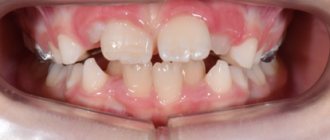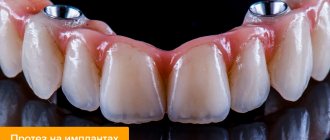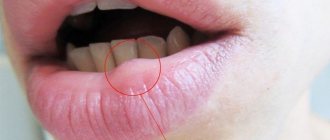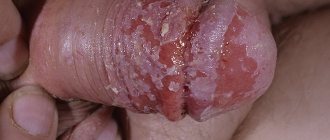Author of the article:
Soldatova Lyudmila Nikolaevna
Candidate of Medical Sciences, Professor of the Department of Clinical Dentistry of the St. Petersburg Medical and Social Institute, Chief Physician of the Alfa-Dent Dental Clinic, St. Petersburg
The taste of blood in the mouth is quite common. However, this symptom should never be ignored. Of course, the reasons for its appearance can be quite harmless, for example, a slight injury to the gums or eating food from clay dishes. However, an unpleasant taste can also indicate very dangerous pathologies. Let's figure out why a metallic taste may appear in the mouth and what to do to eliminate it as soon as possible, and most importantly, remove the reasons for its appearance.
Conventionally, all the causes of a pronounced metallic taste can be divided into three groups:
- Dental problems are usually associated with increased bleeding of the gums.
- Oral injuries.
- Internal pathologies.
Taking various medications often leads to a taste of blood in the mouth.
Coughing up blood: causes of illness in adults
In some cases, when the cough is strong, dry and hysterical, a small amount of scarlet blood in the sputum may be the result of damage to small superficial vessels in the bronchi, pharynx or trachea. This phenomenon is not dangerous if it is not accompanied by other alarming signs. However, if the cough does not subside, the symptoms increase, the volume of blood is significant, or the streaks do not disappear, this may be a sign of serious problems and illnessesSource: EarwoodJS, ThompsonTD. Hemoptysis: evaluation and management // Am Fam Physician. 2015 Feb 15;91(4):243-9..
Metallic taste in the mouth of people of different sexes
A number of reasons that cause the sensation of metal are divided by gender.
For men who work in mining or in industries that use heavy metals, an iron taste may appear during each shift and disappear after the end of the shift. Long-term wearing of massive metal objects (bracelets, watches) also leads to a similar result, since during prolonged contact with the skin the concentration of ions entering the blood through the pores becomes too high.
Women may experience a metallic taste due to:
- pregnancy. Many expectant mothers note that a metallic taste periodically appears during pregnancy. Why does this happen? Firstly, the matter may be a lack of microelements and vitamins, and secondly, changes in hormonal levels and malfunctions in the functioning of receptors that recognize taste can be to blame;
- the use of weight loss drugs and various biological additives, which often leads to poisoning due to incorrect dosages and the desire to quickly get the most pronounced result possible;
- insufficient amount of fluid consumed (women resort to this remedy to lose weight and get rid of swelling). A metallic taste is one of the signs of dehydration.
It is best to start combating this not very pleasant feeling by visiting a doctor who will prescribe the necessary tests and examinations. Otherwise, you can look for reasons on your own and continue to experience discomfort regularly for a very long time.
What diseases are typical for hemoptysis?
The appearance of sputum with blood when coughing is called hemoptysis, it is possible with various diseases:
- COPD with severe bronchitis or emphysema;
- pneumonia (acute or exacerbation of chronic);
- tuberculous lesions of the lungs and bronchi;
- cancerous tumor in the lungs;
- injuries to the chest and lung tissue.
In addition, impurities of blood in coughed up mucus are possible with lesions of the nasopharynx (including nosebleeds) and the upper parts of the digestive tract.
If cough or hemoptysis appears, even without fever, it is important to consult a doctor. This is especially dangerous if symptoms such as fever, shortness of breath, severe weakness, pain in the body or limbs appear against the background of coughing up blood. You need to call an ambulance immediately. Such an attack may be a symptom of a serious illness. It is important to immediately determine the correct diagnosis and begin treatment. Source: K. Krenev, Ya Kabysh, O Yudin. Difficult patient or patient with hemoptysis // Sciences of Europe, 2022, No. 48, pp. 17-22.
Metal structures in the mouth
After installing braces and crowns, dentists warn patients about the possible appearance of a metallic taste - this is a normal phenomenon that should subside within a week after the procedure. If this period has passed, and discomfort still makes itself felt, the reasons may be as follows:
- allergy to metal. It is very rare, but taking an allergy test will not be superfluous. If the suspicion is confirmed, the only solution will be a complete replacement of all installed structures;
- galvanism (interaction between metals), which occurs in the case of installation of orthopedic structures made of different materials that interact with each other. If all the crowns and posts are made of the same material and the amalgam fillings are replaced, the problem will disappear.
If you have metal dentures or implants, an iron taste may become noticeable after consuming acidic foods and drinks. Accordingly, the presence of piercings on the tongue or lips can also cause a similar effect.
Diagnostic methods
Since coughing up blood can be a sign of a serious illness, it is important to make a diagnosis as quickly and accurately as possible. A complex of laboratory tests and necessarily radiography or CT, ultrasound or MRI are required to determine the source of bleeding, especially if it is severe enough. Sometimes blood may not come from the respiratory system, but from soft tissues, the pleural cavity or the esophagus.
A detailed medical history is important - all health problems that preceded the appearance of the cough (smoking, injuries, colds, abdominal pain, etc.). They may indicate possible causes. If the source of bleeding is in the bronchi, an additional bronchoscopy may be prescribed. All diagnostic procedures are usually performed during hospitalization in a clinic.
Metal taste as a symptom of oral diseases
Patients with gum problems often complain of a strong metallic taste that occurs repeatedly throughout the day. The most popular diseases that provoke such unpleasant sensations include periodontitis and gingivitis, which are accompanied by bleeding gums, and many people describe the taste of blood as metallic. It usually appears during brushing your teeth and after eating. Some patients feel as if there is a foreign body in the mouth, which causes serious inconvenience.
Loose teeth and tartar build-up can also cause a metallic taste. There is no point in trying to independently identify the causes - it is better to immediately contact a dentist.
Treatment
It is important to remember that hemoptysis is only a symptom. It is important to treat the underlying condition and make efforts to stop the bleeding. If these are inflammatory processes (pneumonia, bronchitis), a course of antibiotics and anti-inflammatory therapy in combination with drugs to regulate blood clotting are indicated. Regular cleansing of the bronchi from bloody sputum (sanitation) is also indicated.
If this is a tuberculosis lesion, anti-tuberculosis therapy is necessary, including surgical interventions on the affected lesions (cavities). For injuries and abscesses, the solution to problems is surgery; for cancerous lesions, tactics are selected individually, depending on the stage. Source: Ittrich H, Bockhorn M, Klose H, Simon M. The Diagnosis and Treatment of Hemoptysis // The Diagnosis and Treatment of Hemoptysis.Dtsch Arztebl Int. 2017 Jun 5;114(21):371-381. doi: 10.3238/arztebl.2017.0371..
Clinical researches
The effectiveness of various ASEPTA mouth rinses has been repeatedly proven clinically.
For example, it has been clinically proven that the two-component mouth rinse ASEPTA ACTIVE more effectively combats the causes of inflammation and bleeding compared to single-component rinses - it reduces inflammation by 41% and reduces bleeding gums by 43%.
Sources:
- The role of anti-inflammatory rinse in the treatment of periodontal diseases (L.Yu. Orekhova, A.A. Leontyev, S.B. Ulitovsky) L.Yu. OREKHOVA, Doctor of Medical Sciences, Prof., Head of Department; A.A. LEONTIEV, dentist; S.B. ULITOVSKY, Doctor of Medical Sciences, Prof. Department of Therapeutic Dentistry of St. Petersburg State Medical University named after. acad. I. P. Pavlova
- The effectiveness of the use of Asept “adhesive balm” and Asept “gel with propolis” in the treatment of chronic generalized periodontitis and gingivitis in the acute stage (Municipal Dental Clinic No. 4, Bryansk, Kaminskaya T. M. Head of the therapeutic department Kaminskaya Tatyana Mikhailovna MUZ City Dental Clinic No. 4, Bryansk
- The effectiveness of complex therapy in the treatment of periodontal diseases. (Department of Periodontology of the SF State Budgetary Educational Institution of Higher Professional Education MGMSUIM.A.I. Evdokimova. Moscow.) Nemeryuk D.A. - Associate Professor, Candidate of Medical Sciences, Dikinova B.S. - Postgraduate Student of the Department of Periodontology of the SF Tsargasova M.O. - Postgraduate Student of the Department periodontology SF Yashkova V.V. - postgraduate student of the Department of Periodontology of the SF Department of Periodontology of the SF State Budgetary Educational Institution of Higher Professional Education MGMSUIM.A.I.Evdokimova. Moscow
Prevention
The main methods of preventing hemoptysis are preventing the pathologies that cause it. Quitting smoking, maintaining a healthy lifestyle, regular exercise, and timely treatment of colds are important.
Sources:
- Earwood JS, Thompson TD. Hemoptysis: evaluation and management // Am Fam Physician. 2015 Feb 15;91(4):243-9.
- Ittrich H, Bockhorn M, Klose H, Simon M. The Diagnosis and Treatment of Hemoptysis // The Diagnosis and Treatment of Hemoptysis.Dtsch Arztebl Int. 2022 Jun 5;114(21):371-381. doi: 10.3238/arztebl.2017.0371.
- K. Krenev, I am Kabysh, O Yudin. Difficult patient or patient with hemoptysis // Sciences of Europe, 2022, No. 48, pp. 17-22
When a person needs emergency help
Minor hemoptysis with a correctly diagnosed cause is not a reason for emergency hospitalization. After the examination, the doctor prescribes the necessary treatment, taking which the patient usually notes a regression of the symptoms of the disease.
A cause for concern is the copious secretion of foam and red blood when coughing. This is a symptom of pulmonary hemorrhage, if suspected, it is necessary to urgently call an ambulance. In addition, its symptoms are:
- cyanosis or pallor of the mucous membranes and skin;
- increasing tachypnea and tachycardia;
- drop in hemodynamics (decreased blood pressure, thready pulse);
- cold sticky sweat, ringing in the ears, dizziness.
Before the ambulance team arrives, the patient should be in a sitting position or lying on his side with his head turned to the side. This is necessary in order to prevent aspiration of blood. Patients with pulmonary hemorrhage are admitted to the intensive care unit and continue to be treated there until their condition is completely stabilized.
About cough
A cough is primarily a reflex process that occurs when the mucous membrane of the throat is damaged. It does not occur as an independent symptom, therefore in each case it requires a certain medical intervention.
The cause of inflammation may lie in a common flu. Colds occur spontaneously and are accompanied by itching and irritation, pain in the larynx, chills, lethargy and drowsiness. At the same time, patients note changes in body temperature, fever, and muscle pain.
Cough is a faithful companion to a viral or infectious infection of the respiratory tract. You can get rid of the disease with the help of antiviral and anti-inflammatory drugs.
A cold cough can be cured with anti-inflammatory medications. You can find out which tablets are prescribed during this period here.
If the cough appears after a cold or flu, most likely bacterial growth . You can get rid of this etymology only with the help of powerful broad-spectrum drugs.
Important! Antibiotics are not prescribed on the first day of inflammation. The doctor must verify the bacterial nature of the inflammation, and this requires about three days.
In addition to bacterial and viral nature, cough can be allergic. It occurs as a protective reaction upon contact with allergens. The most common causes include interaction with pets or contact with dust and dirt. Other types of allergens include dust, flowers, some food products, cosmetics, and perfumes.
You can find out how to cure an allergic cough here.
Allergic inflammation should be treated as quickly as possible. If the irritant is not eliminated soon, there is a risk of developing cough asthma.









